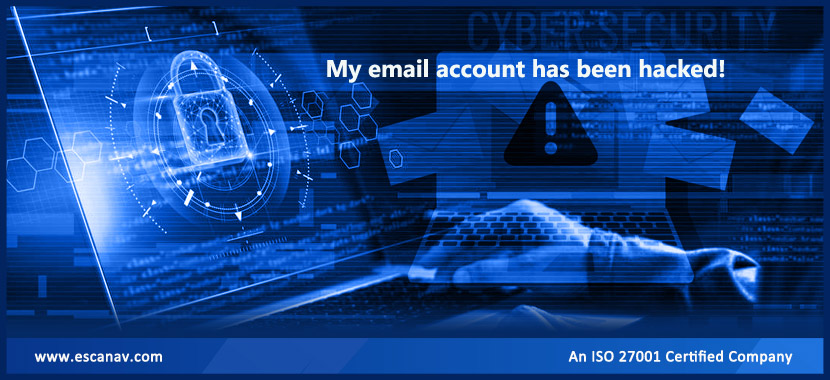If you discover that your email has been hacked, one of your first reactions is to wonder what to do.
Answer: take a deep breath and jump into action. There are five things you can do to prevent or minimize your account’s damage following a compromise.
So why do hackers go after email accounts? In fact, that email account of yours is a treasure trove. There’s a high probability that it contains years of correspondence between friends and family, as well as emails from banks, online retailers, doctors, contractors, business contacts, and more. Overall, your email combines a lot of personal information in one place, which makes your email an attractive target for hackers.
Take a look at how you can take back control of your email account, along with some measures you can take to prevent it from being hacked in the first place.
You Can’t Access Your Email Account:
That one speaks for itself. While checking your email, you discover that your username and password combination have been rejected. You try again, knowing you’re using the right password, but still nothing. There’s a possibility that a hacker can do this: Get your password, log in, and then change your password, locking you out and giving them control of your account.
One of Your Contacts asks, “Did This Email Really Come from You?”
Hackers frequently compromise email accounts in order to disseminate malware on a large scale. They can reach dozens, if not hundreds, of others with a bogus email that may include a malware-infected attachment by blasting emails to anyone on your hacked contact list. And, without a doubt, some of those emails may appear odd. They sound and read nothing like the person they’re attempting to impersonate—you—to the point where some of your contacts may wonder if this email really came from you. On the other hand, this is a good reason to never open unexpected attachments. Similarly, if you receive an unusual email from a friend or business contact, notify them. You could be the first sign that their email has been compromised.
Device Performance is Erratic and Slow:
A slow device could be an indication of malware in general. Malware is notorious for acting as a system and resource hog, causing your device to run slowly, turn off and on abruptly, or even overheat. In some cases, malware logs keystrokes on your computer or taps on your phone to steal information such as usernames and passwords, allowing a hacker to take control of the accounts associated with them—such as your email and bank accounts. This makes a compelling case for antivirus and antimalware software that is automatically updated to protect against the most recent threats.
What Can I do if My Email is Hacked?
1) Change your passwords:
Unless possible, change the password for your email account. Make it a strong, another password; never reuse a password from another account. Then, if you use the same or similar passwords for other accounts, update them. (Hackers count on people reusing passwords in general, as well as on people using simpler and less unique passwords across multiple accounts.) This last work could be done for you by a password manager included with comprehensive online security software.
2) If Needed, use Your Email Service Provider’s Recovery Service:
If you’ve been locked out of your account because you assume the hacker changed the password, your email provider should have a webpage dedicated to recovering your account in the event of a lost or stolen password. (For example, Google provides this page for Gmail and other services users.) This is an excellent reason to keep your security questions and alternate contact information up to date with your provider, as this is the primary method for regaining control of your account.
3) Write an Email to Your Email Contacts:
As previously stated, a large part of the hacker’s strategy is to get their hooks into your address book and spread malware to others. Send an email to all of your email contacts as soon as possible to inform them that your email has been compromised. And, if you’ve done so, notify them that you’ve reset your password and that your account is now secure. Inform them that they should not open any emails or attachments sent by you during the time your account was compromised.
4) Scan your Device for Viruses and Malware:
As previously stated, there are several ways for a hacker to hold your email account information, one of which is through the use of malware. To ensure your device is malware-free, run a thorough virus scan with comprehensive online protection software. If you haven’t already, set up a regular scan to run automatically. That will help to keep things clean in the long run.
5) Check your other Accounts: One bad hack can indeed lead to another. If someone has access to your email and all of the messages in it, they may have everything they need to carry out additional attacks. Assess your other accounts, including banking, finances, social media, and other services you use, for any unusual activity.
The Big Picture: Keep an Eye on Your Identity.
In a general way, your email account is one of several components that make up the overall picture of your online identity. Other important components include your online banking and shopping accounts, among others. Without a doubt, these are the things to keep an eye on.
Check your credit report for any indications of unusual activity. Your credit report is an effective tool for detecting identity theft. And in many cases, it’s completely free. The Fair Credit Reporting Act (FCRA) in the United States requires major credit agencies to provide you with a free credit check at least once every 12 months. This service is provided by Canada, and the United Kingdom, as well as several other countries, has the option of receiving free reports. Even if you don’t suspect a problem, it’s a good idea to check your credit report.
You can protect your identity in addition to monitoring it. Online identity protection services like ours can provide around-the-clock monitoring of your email addresses and bank accounts, as well as up to $1 million in ID theft insurance in the event your identity is compromised. It can also assign an identity recovery expert to your case if you require assistance following an attack or breach. Taking this step, along with many others, can help keep your email account safer from attack in the first place.






